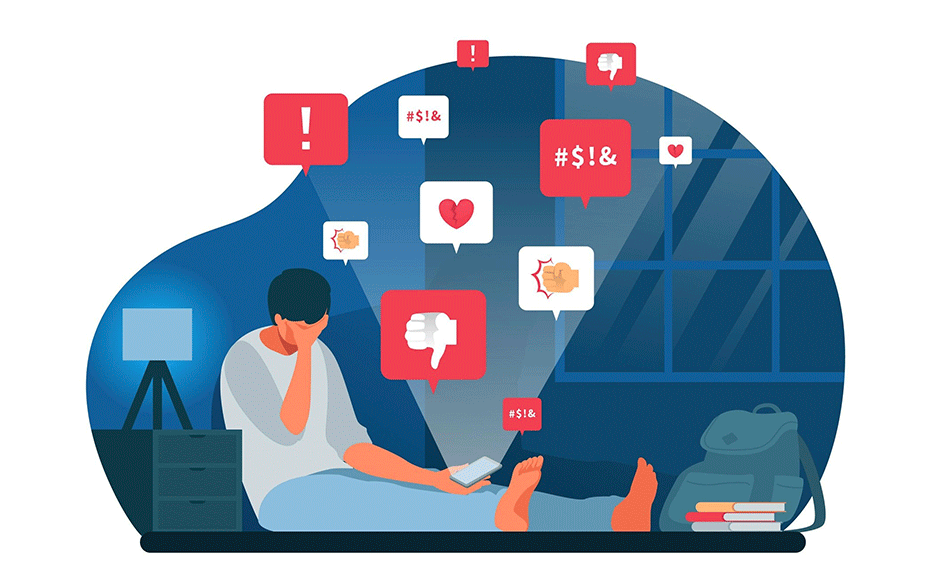- Mumbai, New Delhi, Bangalore
- (+91) 81518 30000
- WhatsApp Now
- contact@vedawellnessworld.com
In today’s digital age, media consumption has become an integral part of our daily lives. From news outlets and social media platforms to entertainment streaming services, we are constantly surrounded by content. While the media has made it easier to stay informed and connected, excessive consumption can negatively affect our mental health. The rise in anxiety, stress, and depression among individuals is often linked to the overwhelming amount of information they consume daily. This blog explores how media consumption affects mental health and offers practical strategies to establish healthy boundaries.
In the past, people received news through newspapers or radio, which provided a manageable amount of information. Today’s digital platforms offer a 24/7 stream of global updates, amplifying distressing stories about natural disasters, political unrest, or health crises. This constant flood of content leads to information overload, heightening anxiety and leaving people feeling helpless or overwhelmed.
Social media platforms often contribute to feelings of inadequacy and Fear of Missing Out (FOMO). Seeing others share their achievements or glamorous moments can lead to self-comparison, fueling feelings of dissatisfaction and low self-esteem. This phenomenon has been closely linked to increased anxiety and depressive symptoms.
The habit of doomscrolling—compulsively scrolling through negative news and social media posts—has become prevalent, particularly during times of crisis. While the intention is often to stay informed, this behavior can quickly become harmful, leading to chronic stress, fear, and even depression.
Social media often portrays a carefully curated version of reality, showing only the highlights of people’s lives. This creates a distorted perception that can trigger body image issues, self-criticism, and a sense of inadequacy. Users may struggle to separate these idealized portrayals from their own realities, leading to increased dissatisfaction.
Platforms like Instagram, TikTok, and Twitter are designed to provide instant gratification through likes, shares, and comments. The addictive nature of this engagement can undermine people’s ability to find intrinsic value in themselves, leading to an unhealthy dependence on social media for validation.

Constant exposure to distressing news can lead to heightened levels of anxiety and stress. The repetitive nature of negative content reinforces harmful thought patterns, creating a cycle of worry and tension that may contribute to anxiety disorders over time. For those dealing with anxiety issues, managing media consumption is crucial.
The link between social media use and depression has been widely researched. Individuals who spend excessive time on social platforms often report feelings of isolation and depression, particularly when they engage in social comparison. Instead of fostering connection, these platforms can intensify feelings of loneliness and inadequacy.
Excessive screen time, especially before bed, can interfere with the body’s circadian rhythms, leading to sleep disorders such as insomnia. The blue light emitted by screens disrupts melatonin production, while distressing content consumed late at night may trigger overthinking, making it difficult to fall asleep.
Social media often perpetuates unrealistic standards of beauty, which can lead to body image issues and low self-esteem. The constant comparison to idealized versions of others contributes to a distorted sense of self-worth, particularly among young adults and adolescents.
Excessive media consumption can significantly impact mental health, but seeking professional help can make a difference. Veda Rehabilitation and Wellness Centres, located in Mumbai, Bengaluru, and Delhi, offer specialized programs to address issues stemming from anxiety, depression, and addiction—many of which are exacerbated by unhealthy media habits. Veda’s approach integrates evidence-based therapies, holistic wellness practices, and personalized care to help individuals reclaim their mental well-being.
In addition to addressing mental health through therapy, Veda offers detox programs designed to reset both the mind and body. These programs, such as the 4-day detox or 10-day detox, are excellent ways to take a break from media, recharge, and focus on mental clarity. These programs combine medical supervision with holistic therapies, including yoga, meditation, and nutrition support, to cleanse both the mind and body.
At Veda, patients can also access a wealth of resources such as informative blogs, videos, and self-help content focused on mental health and wellness. These resources provide guidance on managing media consumption, reducing stress, and building healthier habits in everyday life.

Limiting daily screen time is an effective way to reduce information overload and anxiety. Apps like Screen Time for iPhone and Digital Wellbeing for Android allow users to monitor and control their media usage. At Veda Rehabilitation and Wellness, patients are encouraged to use such tools as part of their recovery, allowing them to develop a healthier relationship with technology.
Unfollow or mute accounts that contribute to stress, anxiety, or feelings of inadequacy. Instead, follow positive, educational, and uplifting content. Veda’s holistic approach also emphasizes mindfulness and intentional media consumption, helping individuals take control of their digital environments.
Creating tech-free zones in your home, such as the bedroom, or committing to tech-free periods, particularly in the morning and evening, can improve mental clarity and promote relaxation. Establishing these boundaries is key in maintaining a balanced relationship with media.
Before engaging with media, ask yourself whether it will add value or cause unnecessary stress. Mindfulness practices taught at Veda—such as meditation, breathing exercises, and emotional regulation techniques—can help you cultivate a more intentional approach to media consumption.
Balancing screen time with offline activities like yoga, nature walks, reading, or creative hobbies can have a profound impact on mental health. Veda incorporates these activities into its wellness programs, promoting relaxation and self-awareness.
If you find that media consumption is significantly affecting your mental health, seeking professional help is essential. At Veda Rehabilitation and Wellness, trained professionals can help you manage the impact of media on your mental well-being through therapy and support.
In a world dominated by media, it’s crucial to create healthy boundaries that protect your mental health. Recognizing the negative effects of excessive media consumption and taking steps to reduce exposure can significantly improve well-being. By setting time limits, practicing mindfulness, and engaging in enriching offline activities, you can foster a positive mental health environment.
Veda Rehabilitation and Wellness is here to support you in your journey toward a healthier relationship with media. With specialized detox programs, resources like blogs and videos, and holistic therapies designed to reset your mental and emotional health, Veda provides the tools you need to regain balance in your life. Reach out to Veda Rehabilitation and Wellness today to begin your path toward a healthier, more mindful future.